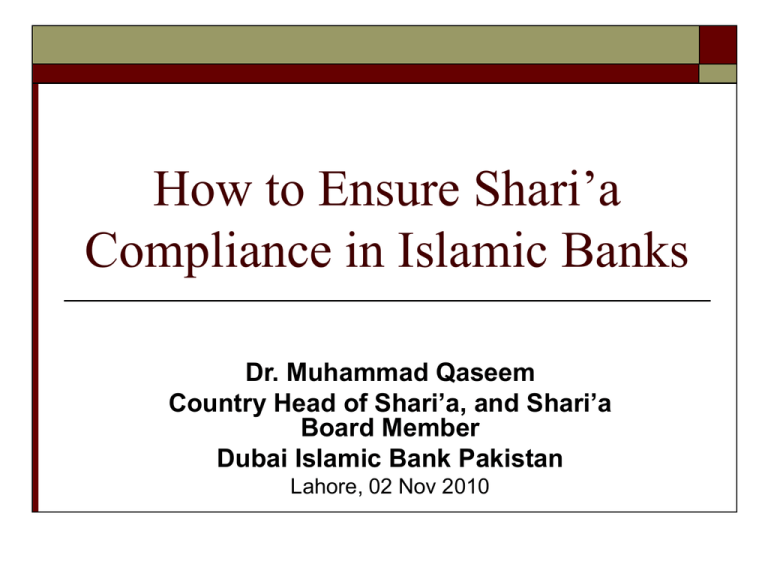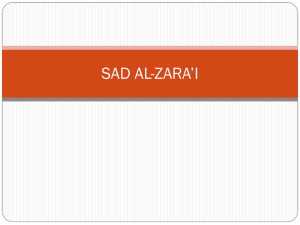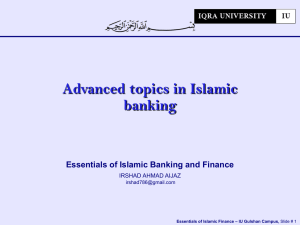Islamic Banking Products: Shari`a Compliance
advertisement

How to Ensure Shari’a Compliance in Islamic Banks Dr. Muhammad Qaseem Country Head of Shari’a, and Shari’a Board Member Dubai Islamic Bank Pakistan Lahore, 02 Nov 2010 Main points Shari’a Compliance, Meaning & Importance Challenges in Developing Shari’a Compliant products Role of the Main Stakeholders in Ensuring Shari’a Compliance Issues of Shari’a Compliance in Various Products Meaning of Shari’a compliance Shari’a compliant means permissible in Shari’a A financial contract is permissible unless there is a Shari’a evidence prohibiting it What is Shari’a evidence? General Permission There is no need for specific permission Difference between Mu’amalat and Ibadat Shari’a compliant and Shari’a based, any difference? Maqasid Shari’yyah A contract is Shari’a compliant if Executed by legally qualified parties with their consent which requires knowledge of the details No involvement of Riba or doubt of Riba No Gharar (Wujud, Husool, Meqdar) Not disallowed by the Mujtahideen, based on the entire Fiqhi literature A contract is Shari’a compliant if its outcome is Halal __ I’etebar ul Ma’al is not used as a legal device to allow Haram there is no condition in the contract against its nature Al Kharaj o Bed dhaman, (Title and possession) principle complied with Importance of Shari’a Compliance Shari’a Compliance distinguishes IFIs from conventional banks Accountability to Allah and to people Shari’a Compliance an issues of Corporate Governance Shari’a Compliance the basis of People’s choice amongst IFIs Shari’a Compliance a safeguard against loss, reputation risk Compliance tool for growth and sustainability Challenges in Developing Shari’a Compliant Products The main stakeholders: Shari’a advisors, bankers, regulators, customers Conformity with laws, regulations, accounting policies Commercial viability: pricing, taxation Negative Perception: use of benchmarks, mimicking conventional structures, marketing tactics Role of Shari’a Advisors/Boards Shari’a Advisor or Board? Its level of involvement and authority Need for a blend of expertise: Knowledge of regulations, laws, banking ops, aptitude Shari’a Compliance Manual Shari’a Department structure, resources Product Development process: Presentation of the issue to SA Fatwa and Structure documentation processes, product manuals/programs proper accounting entries Advertising material Role of Shari’a Advisors/Boards Global acceptability: Avoiding dubious structures, standardization of products Shari’a Audit and its independence Training of the staff Technical Training Islamic Orientation Educating the Customers/masses Shari’a Secretariat: Proper Communication between the Management and Shari’a Advisor/Board Role of Regulators Separate Laws and Regulations: Treating Islamic Banking differently Appropriate regulations, but avoid over-kill, gradual Shari’a Board at national level/role: Standardization of Products and Innovation at National Level Restricting/Banning dubious products Shari’a Advisors’ Fit & Proper Criteria Strengthening Shari’a Advisors: Powers and limitations of Shari’a Boards Training for all: Bankers, Shari’a scholars, auditors Shari’a Audit by the Regulator Role of Bankers and Customers Islamic Orientation, Faith in Islamic banking To Differentiate between Halal & Haram Proper presentation of issues to Shari’a Not seeking short cuts through by-passing the processes Knowledge of Shari’a rules and principles: Training is a must Educating the customers: Shari’a meetings with customers to identify the issues Issues of Shari’a Compliance in Depository Products Shari’a issues in Pool Management Single Pool or Multiple pools Wakala and Musharaka Pools Asset tagging, transfer of assets between pools Shari’a compliance issues in Profit Distribution of Common Mudaraba Pool Weightages (logical and non-discriminatory) Premature encashment of deposits Profit for broken period/on account Mudarib and Mudaraba’s expenses Issues of Shari’a Depository Products Compliance in Profit Equalization Reserve and Investment Risk Reserve Hiba from the Shareholders Transparency in declaration of profit rates Profit Calculation, monitoring and distribution (involvement of Shari’a and audit) Marketing issues Expected Rate of Return Corporate Deposits, committing rates Shari’a Issues in Asset Products Marketing Issues Documentation, signing sequence Late Payment Ijara-based products’ issues Insurance Maintenance Loss of asset Murabaha products’ issues











